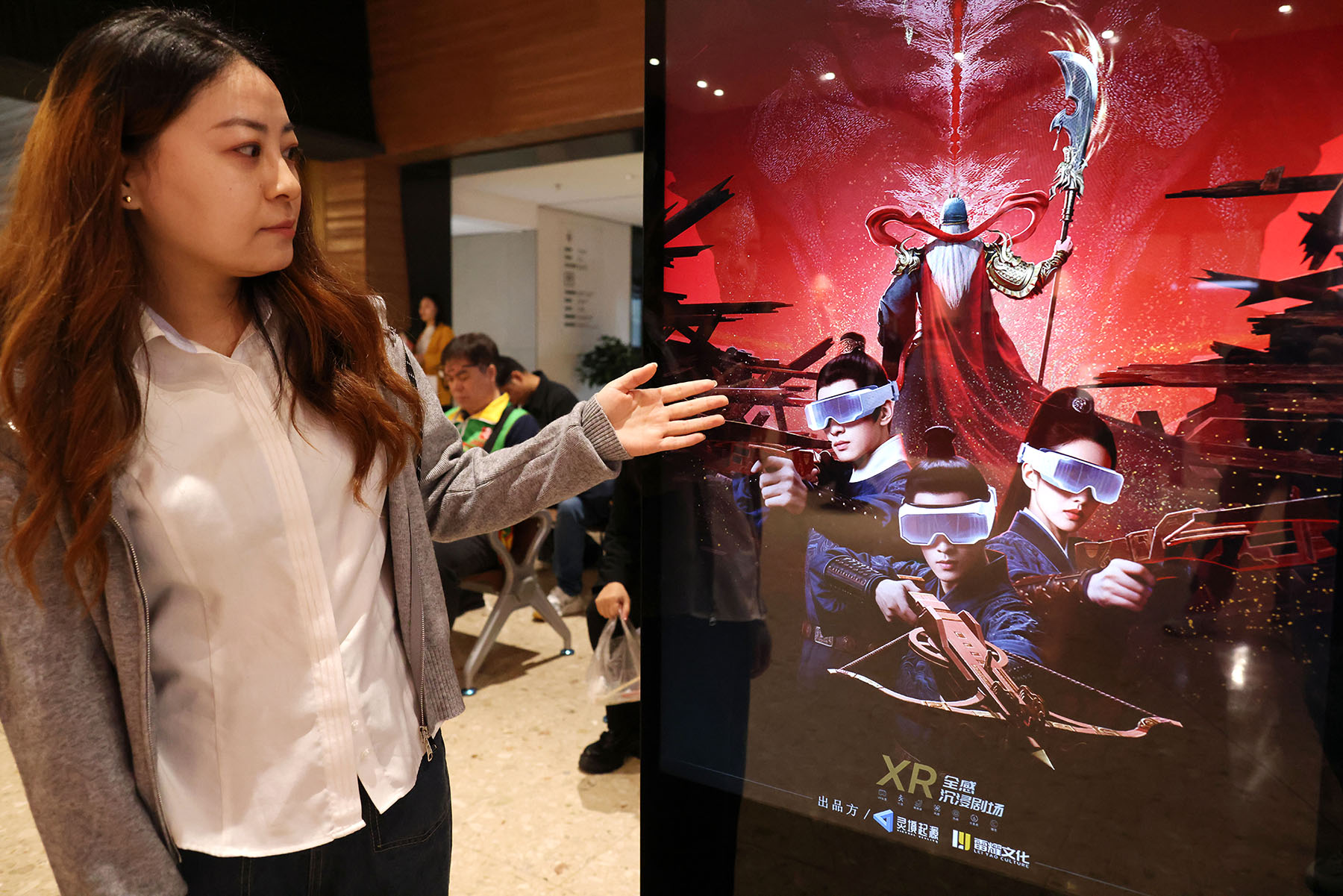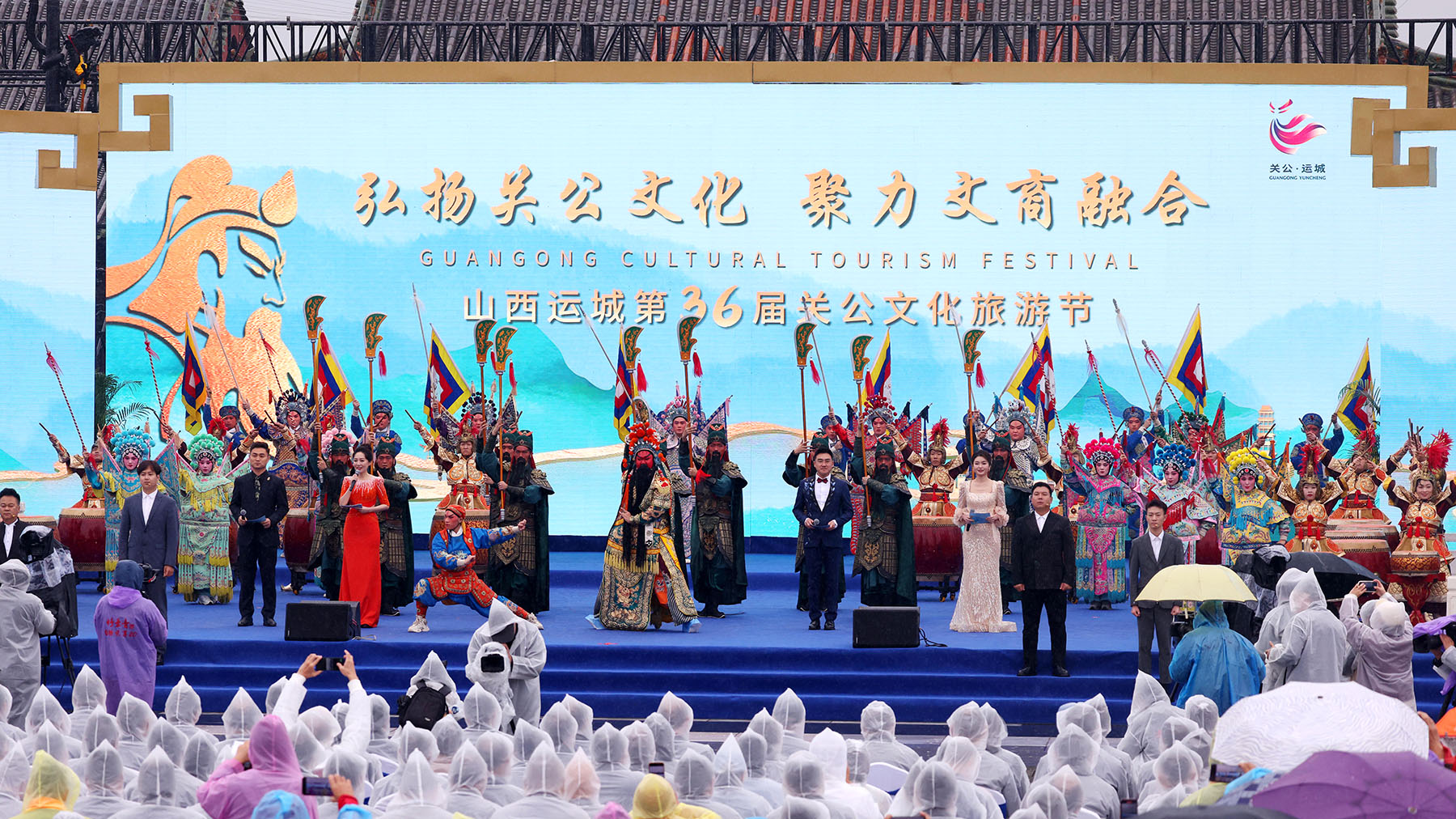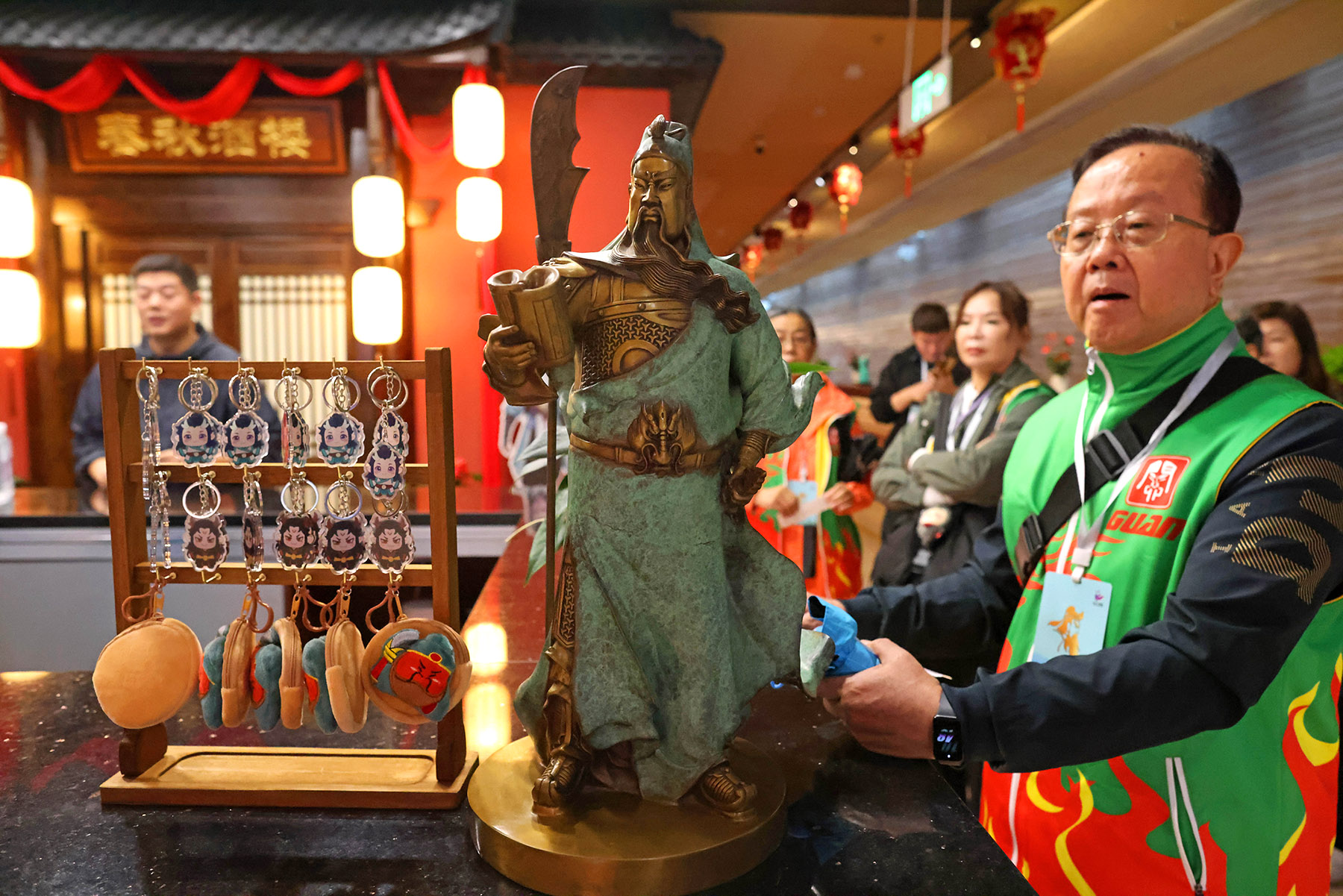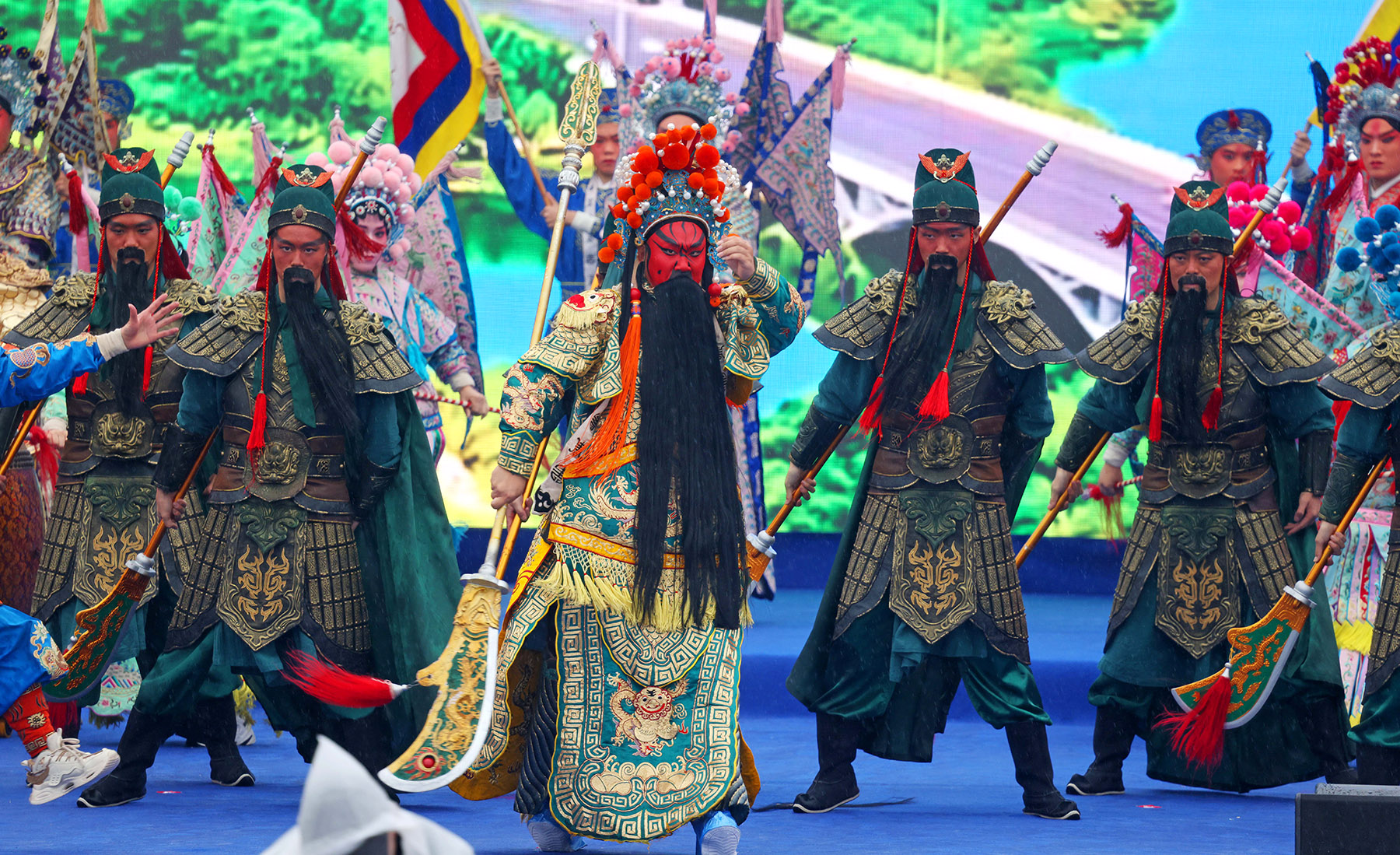A third-century warrior's spirit of integrity unites Chinese community around the world, Hou Chenchen and Zhu Xingxin report in Yuncheng, Shanxi.

The winter of 219 was meant to close a life, not begin a legend. A general lost his last battle, was captured, and executed. Yet, in defeat, he began a different journey — one that would transform him into something far larger than life, a figure worshipped and reimagined for 1,800 years to the present day.
That figure is Guan Yu (160-220), born in what is now Yuncheng, Shanxi province. A loyal commander and sworn brother to Liu Bei, the founding emperor of the Shu Dynasty (221-263), one of the Three Kingdoms (220-280), he was widely celebrated for his valor and integrity by all three kingdoms long before his fall.
But death opened another story: in time, Confucian, Buddhist, and Taoist traditions each embraced him, elevating his name from Guan Yu to Guangong (Lord Guan), then finally to Guansheng Dijun (Imperial Lord Guan), or Guandi. The 36th Guangong Cultural Tourism Festival opened in September at his ancestral temple in Haizhou town in Yuncheng — first built in the Sui Dynasty (581-618) and still the spiritual center of his global devotion.
READ MORE: Spirit of superhero endures on stage
"Guangong culture has been passed down and developed for over 1,800 years," says Chu Xianghao, Yuncheng's Party secretary, at the opening ceremony. "It has become an integral part of the Chinese national spirit, serving as a spiritual bond that enhances the emotional, cultural and national identity of Chinese people worldwide."
The reach of Guangong is staggering. "Incomplete records show at least 168 countries and regions host over 30,000 Guandi temples or Guangong associations," says Fu Wenyuan, director of the Haizhou Guandi Temple Cultural Relics Protection Institute.
In Yuncheng alone, some 200 Guandi temples are protected cultural relics. The densest concentration is in Fujian province, where some villages have four or five, according to Fu.
Wherever the Chinese diaspora settled, beliefs about Guan Yu followed — temples and altars dot New York, San Francisco, Kobe, Yokohama, Singapore and Bangkok. Today, Guan Yu is still widely worshipped by the Chinese across class and professions; he is worshipped in martial temples and small shrines, which are also found in countless homes, businesses and grassroots organizations. In Hong Kong, a shrine to Guan Yu often stands in police stations, a quiet emblem of protection and duty.

Connecting people
For many in Taiwan, the bond is particularly intimate. Chang Ya-chung, general principal of Sun Yat-sen School in Taiwan, traces his roots to Yuncheng. "My father often told stories of my hometown Yuncheng, also Guangong's homeland," he says.
Chang estimates Guangong is known in every household across the island and enshrined in thousands of temples, revered by nearly 10 million people. For Chang, promoting Guangong culture goes far beyond nostalgia; it is an affirmation of a shared cultural identity. "Guangong culture is a quintessential part of our traditional Chinese heritage," he says. "Its core spirit runs deep in the veins of every Chinese descendant."
That sense of connection was palpable at the festival. Among the attendees from Taiwan was Yu Tung-jen, director of the Holy Emperor Guan Public Welfare Association, who returned after 12 years with a statue originally brought from the Chinese mainland. "We hope to come back every year," he says, "to promote Guangong's spirit together".
In Taiwan, Guangong's birthday sparks island-wide pilgrimages. One bicycle event, named after his horse chitu, or Red Hare, circles the island in 12 days. Now, Yu and his group plan a longer pilgrimage: 3,600 kilometers from Taiwan to Haizhou, a 36-day cycling journey to help Taiwan people "reconnect with cultural roots".
"There has always been interaction across the Strait," Yu says. "I am confident that such events will serve to deepen it."
Beyond the Strait, the belief travels farther still. Last year, a ceremonial flame of Guangong belief from Shanxi moved through Henan, Hubei and Fujian provinces, onward to Taiwan, Hong Kong, Macao, and across Southeast Asia.
Soon Boon Hua, who leads the Guan Gong Cultural Association of Malaysia, sees such acts as mapping a living cultural geography.
"The festival strengthens friendly ties between Malaysian and Chinese cities," Soon says. In April, his association led 60 Malaysian entrepreneurs to Yuncheng, building trade and tourism links through a shared culture of Guangong belief.

A dynamic symbol
Wang Shi, honorary chairman of the Chinese Culture Promotion Society, says scholars often focus on the "large traditions" — Confucianism, Buddhism, Taoism — while overlooking the "grassroots traditions" of local worship.
How did a third-century general become a deity for so many people? Wang asks. The answer lies in a distinctly Chinese alchemy of history and folk belief, he adds.
"Promoting traditional culture must not come at the expense of folk belief," he says. Guan Yu's elevation, he explains, follows an ancient principle: those who serve the people deserve veneration. "Gods like Guangong were created by people, to protect, guide and educate themselves. Only a god can carry so many human hopes."
That symbolic breadth lets Guangong bridge social worlds. Wang Juan, a professor of Chinese literature at Peking University, sees him as a vessel of timeless virtues: benevolence, righteousness, wisdom, and courage.
"Benevolence is love; righteousness means trust; wisdom is culture; courage is facing hardship without flinching," she says. "These values speak as strongly today as they did then."
As to how an ancient hero stays relevant, Wang Shi proposes an inheritance "keeping pace with the times" — recasting "loyalty" as dedication to one's work, "righteousness" as integrity in daily life. He proposes creating a Guangong cultural IP to draw the young.

In Haizhou, these ideas are already in motion. The temple now doubles as a location for the popular video game Black Myth: Wukong and a lab for digital storytelling.
Near the Haizhou Guandi Temple, a digital hall offers a more visceral encounter. Here, in the shadow of ancient temple roofs, past and future meet: the scent of incense blending with the glow of headsets, a culture learning not only how to be remembered but also how to keep living.
During the National Day and Mid-Autumn Festival holidays, visitors flock to XR (extended reality) films like Guan Yu Subdues Demons, in which viewers virtually soar over Haizhou on wooden kites, fly through Zhongtiao mountains (one of the birthplaces of Taoism), and battle demons alongside the general.
"Fighting alongside Guangong felt completely real," says Liu Zihan, a tourist from Xi'an, Shaanxi province.
ALSO READ: Keepers of the century past
Guo Lifeng, whose company produced the experience, sees the work as just the start. "We're taking Guangong beyond Shanxi to Hong Kong, Macao, Taiwan, and also to Southeast Asia. We're using technology and youth language to help this tradition travel."
Zhang Zhuozhou of the Shanxi Yuncheng Guangong Culture Research Association is building a "Guangong culture large-scale model", a digital ecosystem pooling data from over 30,000 temples, millions of texts, and thousands of architectural motifs to create an open digital archive for research, education and cultural preservation. Now, Zhang and the team have already collected data on more than 1,000 temples.
"By harnessing global contributions, we hope to build an open, collaborative and shared brand. Our goal is to transform Guangong culture from a regional symbol into a global one," Zhang says.
Contact the writers at houchenchen@chinadaily.com.cn


